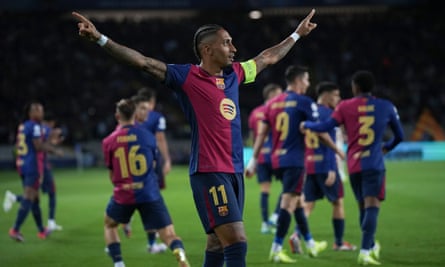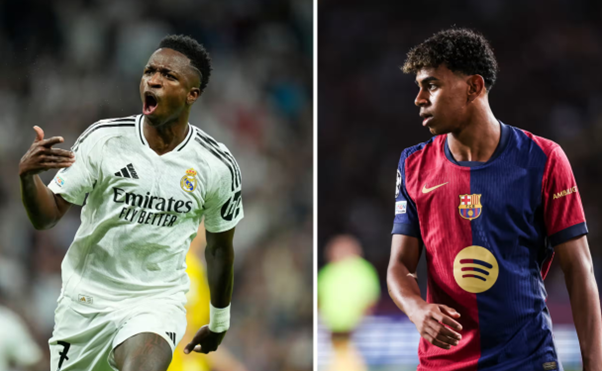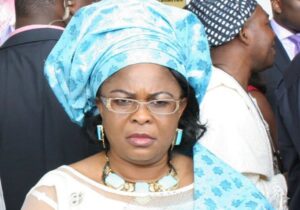Once upon a time there was a football match. They called it el clásico and it was a classic every time, the biggest and best in the whole wide world. Everyone watched it and everything depended on it, so the story goes. It was built up and up and up and still never let you down, an epic battle between two behemoths who went 17 years without a 0-0, going all the way back to the night a pig’s head was thrown at Luís Figo, and who scored a combined 125 goals in a decade. Barcelona and Real Madrid were, after all, the best teams with the best coaches and best players on the planet, matched only by each other.
Were? Are? There is no rivalry like Madrid-Barça and that remains the case, a meeting with a scale and symbolism nothing equals, huge every time. There have been special moments recently, too. And this week’s talk of the best clásico they could remember, a recurring theme on radio and TV, points at extremely short memories and invites fate to leave them looking foolish. But Saturday’s meeting does feel a little different; these two might, just might, actually be the best teams in Europe again; this could be a battle the way it used to be, closer and more competitive than anyone anticipated. A clash of styles and identities. Above all, a clash of titans.
Madrid already were, of course. Champions League winners in two of the last three seasons, six of the last 11. But this is about both of them, about competition, the elite, and it is nine years since Barcelona won in Europe, traumas adding up and the distance between these rivals seeming to as well: in 2018 they fell in Rome, in 2019 at Anfield and in 2020 they were beaten 8-2 by Bayern Munich, the final humiliation. Lionel Messi left, an era ending. They won La Liga in 2023, a feat a little too quickly forgotten, but have been dumped into the Europa League and then dumped out of it again more than once. This, it seemed, was their reality.
A certain dignity was restored last season when they defeated Napoli, Xavi saying: “We were the buffoon of the Champions League … so now what?” Yet defeat against Paris Saint-Germain followed, a superb documentary following Luis Enrique recently revealing the coach saying his former club “play like Eibar”, and Madrid’s closest challengers for a league they ultimately won by 10 points last season were actually Girona.
Since the 0-0 in 2019, the end of a 17-year streak symbolic of a match that was losing something, there have been nine league clásicos. Madrid won seven of them. Last year they won the Spanish Super Cup final 4-1. They also won the Champions League at Wembley. And then they went and signed Kylian Mbappé at last. They were going to walk the league.
Instead, coming into clásico week, it is Barcelona who are top, three points clear having won nine of their opening 10 games, scoring more than anyone else in Europe. Without Toni Kroos, Madrid, meanwhile, have not looked good, although they are still unbeaten domestically.

When Hansi Flick took over in Catalonia, he got a handwritten letter from the president, Joan Laporta, thanking him for coming and explaining what it meant to be at Barcelona; he has grasped it fast, getting everything right, transforming the team.
This is a different Barcelona: intense, fast, lethal on the counterattack. They are running more and more intensely than ever before, brave enough to press high and keep pressing high. “It’s our philosophy; we want to put a lot of pressure on the ball,” Flick explained. “It’s not always easy to [find the time] to train it, so we do more in the meeting rooms but the players are doing really good. We said: ‘OK, we have to do it like this, this, this’, and they adapted.”
Barcelona have caught opponents offside 62 times this season – more than twice as many as anyone else in Europe – and Wednesday night, against Bayern at the Estadi Olímpic Lluís Companys, was a game played on a cliff edge, but they never backed away from the abyss. It is easy to imagine Vinícius Júnior and Mbappé thinking that Flick’s approach will afford them space in which to do serious damage.
Asked about that, Carlo Ancelotti replied: “I have something in mind. I don’t think it’s right to explain it to you today. You can see it tomorrow and then afterwards you can tell me if I made a mistake or not.” And Flick did admit that there might be some need to adapt. Yet against Bayern, it worked: the test of how much he had changed, how real the revolution, how good the clásico might be, was always going to come this week. The first part was passed in style, making the second even more exciting, seemingly an elite clash once more.
Barcelona put four past Bayern, a victory that was also an exorcism. The night before, Madrid had come from 2-0 down to put five past Borussia Dortmund. The timing could not have been better. Both of the country’s big sports dailies ran on the same front-page headline: “What a clásico awaits us!” Raphinha, scorer of a hat-trick 24 hours after Vinícius had got three, said: “Seeing this, it’s difficult for it not to be a spectacular clásico.”

Raphinha has been a revelation, and he is not wrong. He had appeared to be on his way out and he knew it, this week describing the summer pictures of a Barça fan wearing a Nico Williams shirt with the Brazilian’s No 11 on the back as a “lack of respect”. Instead he may well be the best player in La Liga. Or maybe it’s Robert Lewandowski, scorer of more goals than anyone else in Europe’s big five leagues. Or perhaps it is Lamine Yamal, still only 17 but a reality already, the star of Euro 2024 and one of six players aged under 21 who started against Bayern; 10 players from the academy, that seemingly inexhaustible supply of talent, played across the 90 minutes. “That’s La Masia; it’s incredible,” Flick said.
If it’s none of them, it certainly could be Vinícius. Likely to be handed the Ballon d’Or on Monday night – you have to go back 20 years to find a winner who has not played at one of these two clubs – he scored an outrageous hat-trick the night before his countryman did the same, one of the goals seeing Emilio Butragueño drawing parallels with Pelé.
Standing on the podium with him on Monday may well be Jude Bellingham, who scored injury-time winners in both of last season’s clásicos but has not got a goal yet this term, Ancelotti insisting “he doesn’t need to because we have a player who can score 35 or 40”. And that player is Mbappé, who like Flick is preparing for his first clásico, one that might be like the story said after all.
“When you start to play football you want to play in a clásico,” Flick said. “And this is the proper clásico. In Germany we have some games that they call clásicos but it’s not the same, it’s not Real Madrid and Barcelona.”










More Stories
Amorim insists Fernandes not leaving Manchester United amid Madrid reports
How debt burden pushed Nigerian boxer Segun Olanrewaju to a fight that took his life
Nigeria Taekwondo Federation boss, Abdullahi Saidu dies at 53